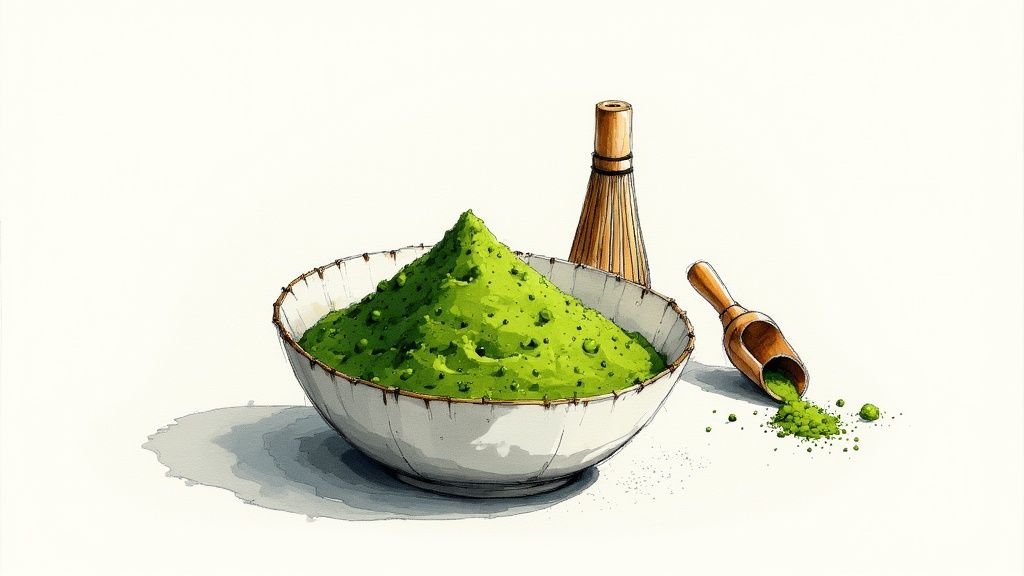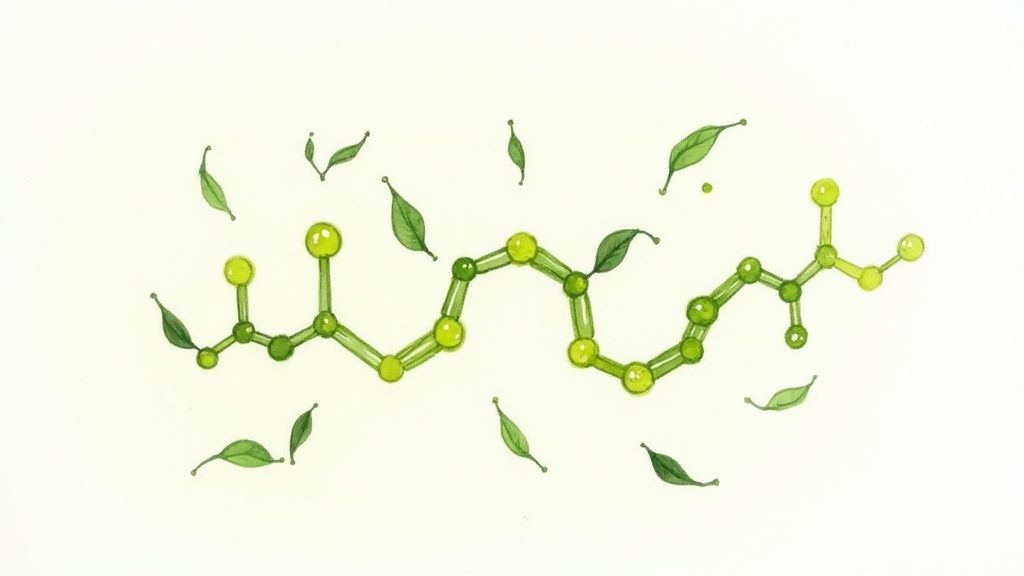What is Matcha Tea?

Matcha tea, a vibrant green powder, offers a unique twist on traditional green tea. Both originate from the Camellia sinensis plant, but their processing methods differ significantly. Regular green tea involves steeping leaves, extracting only some of their beneficial compounds. Matcha, on the other hand, is made by finely grinding the entire tea leaf. This means that drinking matcha allows you to ingest the whole leaf, gaining the full spectrum of nutrients and benefits. This distinctive characteristic contributes to matcha's rising popularity among health-conscious individuals. This naturally begs the question: what makes matcha so beneficial?
Origins and Traditional Preparation
Matcha's history traces back to ancient China, yet it was in Japan that its cultivation and preparation blossomed into an art form. Traditionally, matcha is prepared using a bamboo whisk, called a chasen. The process involves sifting matcha powder into a bowl, adding hot (not boiling) water, and whisking vigorously until a frothy layer appears. This method, integral to the Japanese tea ceremony, elevates both the flavor and the aesthetic experience. This traditional approach reflects the cultural significance of mindful matcha consumption in Japan. It's more than a beverage; it's a practice. But how has this traditional practice adapted to modern life?
Modern Adaptations of Matcha
Today, matcha preparation has evolved to embrace modern conveniences. For instance, many people now use electric frothers for a quicker approach. Furthermore, matcha's adaptability allows its incorporation into diverse recipes. From lattes and smoothies to baked goods and even savory dishes, matcha's unique flavor and vibrant color enhance culinary creations. This adaptability makes matcha accessible to a wider audience, regardless of their familiarity with traditional methods. This makes exploring matcha's benefits an enjoyable and flavorful journey. Let's now explore the specific health benefits that make matcha so prized.
Antioxidant Powerhouse
Matcha's vibrant green color signals its rich nutritional content, particularly its high concentration of antioxidants. These compounds protect our bodies from free radical damage. Free radicals are unstable molecules that can harm our cells, much like rust corrodes metal. Antioxidants act as a defense against this cellular damage, promoting overall health. This protective quality makes matcha a wise addition to a health-conscious diet. But what makes matcha's antioxidant power so exceptional?

Catechins: The Star Players
Catechins, a specific type of antioxidant, are particularly abundant in matcha. Among these, epigallocatechin gallate (EGCG) stands out for its potent health benefits. EGCG offers numerous advantages, including anti-inflammatory properties, which can soothe irritated tissues. It also supports a healthy immune system, bolstering the body's natural defenses. This makes matcha a valuable asset in supporting overall wellness. But how does matcha compare to other sources of antioxidants?
More Than Just Green Tea
While regular green tea contains antioxidants, matcha offers a significantly higher concentration. This is because consuming matcha involves ingesting the entire leaf, while traditional green tea preparation involves discarding the steeped leaves. This difference in consumption leads to a substantial difference in antioxidant intake. In fact, matcha boasts over ten times the antioxidants of a typical cup of green tea. This concentrated dose makes matcha an efficient way to boost antioxidant intake. This begs the question: how do these antioxidants translate to tangible health benefits?
Disease Prevention and Overall Health
The benefits of matcha extend beyond general wellness. The high concentration of antioxidants, especially EGCG, is associated with a lower risk of chronic diseases. For instance, EGCG may offer protection against certain cancers by helping prevent cell damage. Moreover, matcha's antioxidants can support cardiovascular health, promoting a healthy heart and circulatory system. These potential protective effects contribute to matcha's appeal as a health-promoting beverage. This leads us to another important benefit of matcha: its impact on energy and focus.
Energy and Focus Benefits
Matcha provides numerous advantages, from antioxidant power to potential disease risk reduction. But its benefits don't end there. Matcha offers a unique way to enhance energy levels and sharpen focus, providing a compelling alternative to coffee. Let's explore how matcha delivers these cognitive benefits.
The Dynamic Duo: Caffeine and L-theanine
Matcha contains a unique combination of caffeine and L-theanine, an amino acid found in tea plants. Caffeine provides an initial energy lift, while L-theanine works to promote a calm and focused state. This synergy distinguishes matcha from other caffeinated beverages. Caffeine jumpstarts the system, while L-theanine smooths out any jitters, resulting in calm alertness. How does this affect energy levels over time?
Sustained Energy Without the Crash
Unlike coffee, which can cause energy spikes and crashes, matcha provides a sustained and balanced energy release thanks to L-theanine, which regulates caffeine absorption. Matcha provides consistent energy like a slow-burning fire, rather than a fleeting burst of flame. This sustained release is a highly valued benefit of matcha, allowing for prolonged focus and productivity without the afternoon slump. This leads to another important aspect: enhanced cognitive function.
Enhanced Cognitive Function
Beyond energy, matcha can also boost cognitive function. The combination of caffeine and L-theanine has been shown to improve attention, memory, and reaction time. For example, students studying for exams or professionals working on complex projects may find matcha helps them maintain focus. This is because matcha encourages calm alertness, fostering clearer thinking and improved concentration. What's the overall effect of this combination of energy and calm?
A Calming Focus
While matcha energizes, it simultaneously calms. L-theanine promotes relaxation without drowsiness, leading to mental clarity and focus. This is a significant advantage for those who experience anxiety or jitters from caffeine. Matcha's ability to both energize and calm makes it ideal for various activities, from focused work to meditative practices. This balance makes matcha a superior choice to coffee for many, promoting a state of focused calm – energized serenity. Next, we'll discuss how matcha can support weight management.
Weight Management Support

Matcha offers a remarkable range of benefits, from sustained energy and focus to a powerful antioxidant profile. Furthermore, matcha can support weight management goals. This isn't about a quick fix, but rather how matcha can complement a healthy lifestyle. Let's explore how matcha can aid in your weight management journey.
The Metabolism Booster
Matcha has been shown to boost metabolism, the process of converting food and drinks into energy. A faster metabolism leads to increased calorie burning, even during rest. This is like having a more efficient engine, using fuel effectively. This boosted metabolic rate is a valuable benefit for those managing their weight. But what about its impact on fat burning?
Fat Burning Potential
Studies suggest matcha can enhance fat burning by increasing thermogenesis – the body's process of generating heat from burning calories. This can lead to more efficient fat burning during exercise, similar to turning up your body's thermostat. This enhanced fat burning is another valuable advantage of matcha for weight management. How else does matcha support weight management goals?
Blood Sugar Regulation
Matcha may also help regulate blood sugar levels, preventing energy crashes and reducing cravings for sugary snacks. This helps maintain a steady energy supply, preventing sudden dips that can lead to overeating. This blood sugar regulation is crucial for controlling appetite, a key component of weight management. But how does matcha fit into a broader approach to health?
A Holistic Approach
While matcha can contribute to weight management, it works best as part of a holistic approach. Combining matcha with a balanced diet, regular exercise, and stress management maximizes its benefits. This is because matcha's advantages work synergistically with other healthy habits, creating a powerful combination for well-being. Matcha is most effective when integrated into a lifestyle focused on overall health. This holistic perspective is essential for realizing matcha's full potential in supporting weight management. Next, we'll explore how matcha benefits heart health.
Heart Health Benefits
Matcha's benefits are truly impressive, from weight management support to boosting energy. These advantages also extend to a positive impact on cardiovascular health. This section explores how matcha can contribute to a healthier heart. You might also be interested in: The Health Benefits of Matcha Tea.
Cholesterol Management
Matcha tea has been shown to positively influence cholesterol levels, a critical factor in heart health. Studies suggest regular matcha consumption can decrease LDL cholesterol ("bad" cholesterol), which contributes to plaque buildup in arteries. Matcha may also increase HDL cholesterol ("good" cholesterol), which helps remove LDL cholesterol from the arteries. How else does matcha benefit the circulatory system?
Blood Pressure Regulation
Maintaining healthy blood pressure is essential for cardiovascular well-being. Matcha contributes to this by helping relax blood vessels, which can lower blood pressure. This is akin to widening a pipe, allowing easier flow and reducing pressure. This effect can be particularly beneficial for individuals at risk of hypertension. What role do antioxidants play in heart health?
Antioxidant Protection
Matcha is rich in antioxidants, especially catechins like EGCG. These antioxidants protect the heart by neutralizing harmful free radicals, which can damage blood vessels. The antioxidants in matcha act as a shield against these molecules, maintaining circulatory system integrity. This protective effect further strengthens the case for including matcha in your diet. What are the cumulative effects of these benefits?
Reduced Risk of Heart Disease
The combined effects of cholesterol management, blood pressure regulation, and antioxidant protection contribute to a reduced risk of heart disease. Matcha supports a healthy cardiovascular system by addressing these key risk factors. While not a cure-all, matcha can be a valuable part of a heart-healthy lifestyle, particularly important given the prevalence of heart disease. This makes exploring matcha a wise choice for improving overall well-being. Combining matcha with a balanced diet and regular exercise can significantly benefit cardiovascular health. Now, let's delve into matcha's stress reduction properties.
Stress Reduction Properties
The advantages of matcha are diverse, from supporting cardiovascular health to boosting energy. Its benefits also extend to stress reduction and mental well-being. This section explores how matcha can contribute to a calmer, more centered you.

The Calming Influence of L-theanine
Matcha contains L-theanine, an amino acid known for its calming properties. L-theanine promotes relaxation without drowsiness, a key advantage for those seeking stress relief without sedation. This means you can experience tranquility while remaining alert and focused, finding your center amidst daily life's busyness. How does this interact with the caffeine in matcha?
Balancing Act: Caffeine and L-theanine
While matcha contains caffeine, its stimulating effects are balanced by L-theanine's calming influence. This synergy creates a state of calm alertness, unlike coffee's jittery energy. Matcha allows you to navigate stressful situations with greater composure, much like a tightrope walker maintains balance despite potential instability. How does this impact stress hormones?
Stress Hormone Regulation
L-theanine in matcha can help regulate stress hormones like cortisol. Elevated cortisol is linked to negative health effects, including anxiety, sleep disturbances, and weight gain. By helping manage cortisol levels, matcha contributes to a balanced hormonal profile, similar to a conductor orchestrating a harmonious symphony. How do these combined effects benefit mental well-being?
Promoting Relaxation and Mental Clarity
The combined effects of L-theanine and caffeine in matcha create a unique environment for relaxation and mental clarity. L-theanine calms while caffeine enhances focus, leading to a state of relaxed alertness. This is particularly beneficial in our fast-paced, stress-filled world. This benefit of matcha allows you to navigate daily demands with ease and clarity, like having a mental decluttering session. By reducing stress and promoting mental clarity, matcha supports a balanced lifestyle. This makes exploring matcha attractive for those seeking to improve their overall well-being. Now, let's discuss how to incorporate matcha into your daily routine.
How to Incorporate Matcha
We've explored the incredible benefits of matcha, from stress reduction to heart health. But how can you practically integrate this vibrant green powder into your everyday life? This section offers creative and delicious ways to harness matcha's power.
The Classic Matcha Latte
A comforting way to enjoy matcha is the classic matcha latte. This creamy beverage provides a gentle, sustained energy boost, ideal for mornings or afternoons. Whisk matcha powder with hot water until frothy, combine it with your milk of choice, add a touch of sweetener if desired, and enjoy. What are some other ways to enjoy matcha?
Matcha Smoothies: A Nutritional Powerhouse
For a refreshing and nutrient-packed option, blend matcha into your favorite smoothie. Matcha's earthy flavor complements fruits like banana, mango, and pineapple, and its vibrant green hue enhances the visual appeal. This delivers a powerful dose of antioxidants and vitamins, a healthy and delicious way to start your day. Can matcha be used in other ways?
Matcha in Baking: A Unique Twist
Matcha's versatility extends to baking. Its unique flavor and vibrant color can transform cakes, cookies, and muffins. Matcha adds a subtle earthy sweetness and a beautiful green hue to your baked creations, a delightful way to indulge while enjoying matcha's benefits. Are there any surprising uses for matcha?
Savory Matcha Dishes: An Unexpected Delight
Matcha can also add a unique dimension to savory dishes. Incorporate it into sauces, dressings, or marinades for a subtle earthy note. Even try flavoring noodles or sprinkling it on popcorn for a surprising twist. This unexpected application showcases matcha's versatility beyond sweets. What about frozen treats?
Matcha Ice Cream: A Cool Treat
For a refreshing and indulgent treat, consider matcha ice cream. Matcha's earthy flavor complements the sweetness of the cream, creating a unique and satisfying dessert. This cool and creamy delight offers a novel way to enjoy matcha, perfect for a sweet escape. What are some tips for choosing matcha?
Choosing the Right Matcha
When selecting matcha, consider grade and quality. Ceremonial grade, with its vibrant green color and smooth texture, is best for traditional tea preparation and lattes. Culinary grade, while less vibrant, works well for baking and smoothies. Choosing the right matcha for your purpose ensures you fully experience its benefits. How can you enhance the matcha experience?
Mindful Matcha Moments
Beyond recipes, remember the ritualistic aspect of matcha. Take a moment to appreciate the vibrant powder, the whisking process, and the subtle aroma. This mindful approach enhances the overall experience. Ready to explore the world of matcha?
Ready to experience the revitalizing power of matcha? Visit matcha-tea.com and explore our selection of high-quality matcha teas, accessories, and recipes. Discover the rich history, cultural significance, and countless benefits of matcha for yourself!
